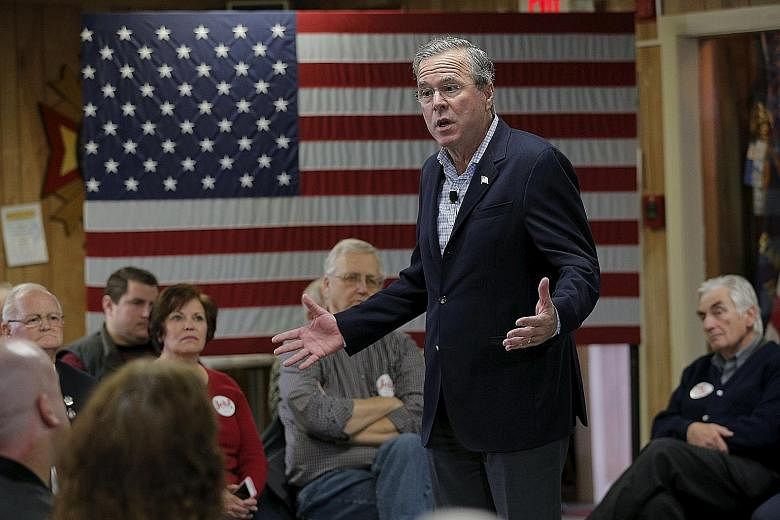NEW YORK • At last, Republican hopefuls in the US presidential campaign have begun focusing on the economy. At a time of rising anxiety among middle-income voters about wealth inequality, and growing awareness of the unsustainability of Social Security and Medicare, this conversation could not be more important. Unfortunately, not enough attention is being paid to the link between these two key issues.
In fact, tackling the problems with Social Security and Medicare is the key to addressing what ails the middle class. But fiscal policy progressives, in particular, remain fixated on using higher tax rates on the wealthy to fund higher incomes for everyone else.
Income redistribution may be an attractive idea for some - including, to a lesser extent, the Republicans who support a watered-down version - but it is fool's gold. As a recent Brookings Institution paper shows, higher marginal tax rates would do little to diminish income inequality.
Higher taxes also cannot resolve the problem posed by the mounting unfunded liabilities of Social Security and Medicare. Keeping these programmes as they are would mean growth-destroying tax increases on middle-income Americans, as well as continuing cuts in government funding for defence, education and research.
There is only one way to ensure broadly shared prosperity in the US: a future-oriented fiscal policy aimed at boosting employment and productivity, maintaining low marginal tax rates, strengthening support for workers, and investing in education, innovation and infrastructure. The alternative - allowing the past, in the form of interest payments on the national debt and entitlement spending, to continue dictating fiscal policy - would block prosperity among middle-income households, by requiring continuous tax increases and reduced public investment.

To fund this future-oriented policy, US leaders must implement reforms that enhance the long-run viability of the social safety net. Social Security and Medicare are unsustainable, with the long-term gap between projected income and promised benefits reaching tens of trillions of dollars - far more than the official debt the federal government has accumulated.
Closing the gap with tax hikes - the burden of which would be borne largely by middle-income households - would threaten living standards and economic growth. Offsetting spending cuts provides no safety valve. Healthcare and Social Security already consume half of the federal budget, up from one-sixth in 1965, and these outlays relative to GDP are projected to more than double by 2040. With no change in course, the programmes' "trust fund" balances will be depleted by the 2030s.
To avoid that outcome, political leaders will need to constrain the growth of entitlement spending and bolster support for the middle-income group. While Social Security and Medicare remain important, their role must be updated to suit today's needs.
For example, to ensure that no one who has worked for 30 or more years will live in poverty in old age, Social Security needs a higher minimum benefit for lower-income workers, with more affluent seniors seeing less growth in benefits over time. Adopting the chained consumer price index for federal benefit calculations would ensure that benefits more accurately represent inflation, while slowing the rate of benefit growth for individuals.
There should also be policies that place a higher value on work. Seniors working past the retirement age of 67 should not be subject to the payroll tax, and the retirement earnings test should be eliminated, so that seniors can work full-time without losing out on Social Security benefits. Finally, incentives for private retirement saving should be expanded.
A similarly honest and modern approach can secure Medicare, without large tax increases on the middle income. For starters, bipartisan proposals for premium support, with seniors receiving subsidies to buy private health insurance, should be implemented.
To enable individuals to prepare to cover the associated deductibles and co-payments, health savings accounts - funds which are not subject to income tax at the time of deposit, and can be used tax-free at any time to cover qualified medical expenses - should be expanded and strengthened. Premium support can significantly reduce Medicare spending, as it establishes a framework for more efficient spending on benefits, driven by competition and innovation in care and coverage.
So far, the only presidential hopeful who has recognised the need for such a future-oriented approach is former Florida governor Jeb Bush, who has proposed modernising reforms of Social Security and Medicare that avoid imposing high costs on middle-income Americans and a heavier debt burden on future generations. His fellow Republican contenders, Ohio Governor John Kasich and Florida Senator Marco Rubio, have also raised constructive reform ideas.
By contrast, former secretary of state and Democratic contender Hillary Clinton and Republican Donald Trump have opposed reform of Social Security and Medicare. Senator Bernie Sanders, Mrs Clinton's Democratic rival, actually proposes to expand the programmes' unfunded liabilities.
With so few presidential hopefuls recognising the link between Social Security-Medicare reforms and ensuring shared prosperity, the US faces serious risks. The progressive redistributive agenda could continue to advance, or the conservative entitlement reform agenda could fail. Either way, there would be growth-limiting tax rises and limits on the contributions that public investment can make to the country's future.
There is a fiscal path to enhancing prosperity for middle-income Americans. It requires support for growth, rewards for work, investment in opportunity and reforms to Social Security and Medicare. One hopes that, as the campaign progresses, honest and forward-looking fiscal policy debates recognising this fundamental truth gain traction.
PROJECT SYNDICATE
•The writer is dean of Columbia Business School and was chairman of the US Council of Economic Advisers under President George W. Bush.

